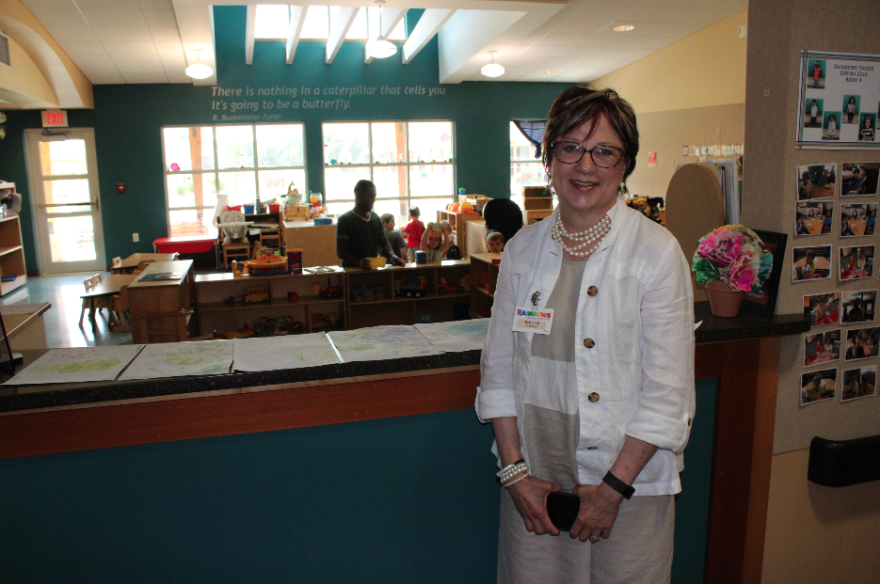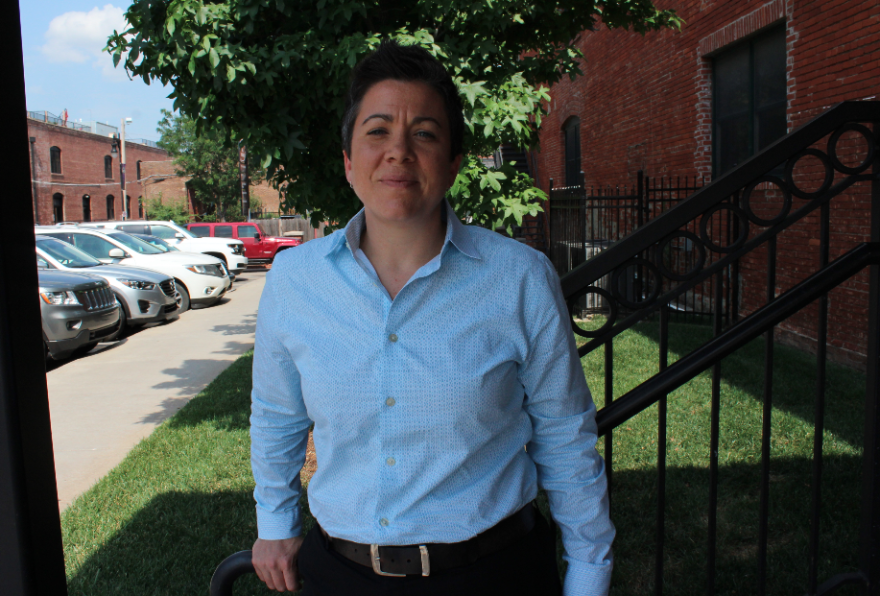Kansas is one of 46 states that have been receiving significant amounts of money each year from tobacco settlements. Nearly 20 years ago, when the settlement was decided, states were encouraged to use the money for cessation programs and tobacco-related health care costs. In Kansas, the money is funneled into an early childhood education endowment. But the programs that rely on this funding are worried that their ability to serve the community will be in jeopardy if large amounts of the settlement money continues to be diverted to the state’s general fund.
Children ages 18 months to two-and-a-half years are singing along with their teachers at Rainbows United in north Wichita. They’re learning to care for a baby doll by wrapping it in a blanket and putting it down for a nap.
Rainbows United has been working with children who have mental and physical disabilities for decades. They offer many services, from early childhood intervention and education like this, to summer camps, latchkey programs and in-home care for people up to 21-years-old.
As students shuffle outside with teaching aids to splash around in kiddy pools, mental health coordinator Audra Kenneson, who is leading the class, talks about the importance of the baby doll exercise.
“This is something we do with kids younger than pre-school age to start teaching them how to make connections, socially and emotionally, with others,” Kenneson says.

It’s crucial that parents and educators identify disabilities or learning disorders early on, according to Deb Voth, president of Rainbows United.
“Children learn half, if not most, of what they need in the first five years of their life," she says. "It’s when they learn to walk, to communicate, interact and along with people. And if we’re not there, and families don’t know what they need to be doing, we’re just losing so much time.”
Voth says the importance of pre-K education, even for children who don’t have disabilities, can’t be overstated. But state funding for early childhood education is being cut.
“It’s been flat-funded at best," Voth says. "And then in November, we took a 3 percent cut, and then as of July 1, we will receive an additional 14 percent cut.”
Voth says in-class programs won’t be affected, but, they’re going to have to do away with a lot of the screenings and assessments they perform on hundreds of children throughout Sedgwick and Butler Counties.
“In all, we’re looking at cuts of close to $100,000," Voth says. "It’s a big cut.”

Much of the funding for early childhood programs and mental health screenings at Rainbows United is provided through Kansas’ tobacco settlement. The nation’s largest tobacco companies agreed to pay about $10 billion a year to 46 states, including Kansas, which receives annual payments of $50 to 60 million. The funding is essentially indefinite, and is meant to reimburse states for health care costs tied to smoking. But states aren’t mandated to spend the money on health care.

“In 1999, [Kansas] policymakers had the good wisdom to say in a statute that we as a state were going to spend that revenue stream that was coming in on early care and education,” says Annie McKay, president of Kansas Action for Children, a group that lobbies for educational spending on all levels.
And thus, the Kansas Endowment for Youth Fund, or KEY Fund, was born. It’s a dedicated account for pre-K education and other child wellness programs. However, over the years, the Kansas Legislature has transferred roughly 20 percent of this funding over to the state’s general fund.
“It’s difficult to establish a lock box as it relates to funding sources in Kansas, and they made the best attempt at doing that with the KEY Fund," McKay says. "However, that has not entirely protected those resources.”
In recent years, the money being swept out of the KEY Fund has been used to help fill budget shortfalls at the request of Gov. Sam Brownback, which can affect programs that are funded through tobacco settlement money. Beth Oaks, vice president of community planning and resources at United Way of the Plains, helps oversee all of the tobacco settlement funding in Sedgwick County, including Rainbows United. She says funding cuts have been severe, and there comes a point when organizations can’t properly do their jobs.
“You can’t have one teacher for 80 kids," she says. "That’s just not a good program design. And that’s where we’re at.”

Oaks says United Way of the Plains once distributed about $2 million of tobacco settlement funding to 14 programs. Now, nine have been dissolved, and they’re down to $1 million of tobacco settlement funding. If that remaining money was to ever go away, Oaks says there’s nothing to replace it.
“We’re fearful," Oaks says. "There’s not a dedicated resource stream for early childhood and we’re very concerned about that. The impact of not investing in early education is very costly long-term.”
It’s possible that the KEY Fund could go away. Shawn Sullivan, Brownback's budget director, says there shouldn’t be any protected classifications for funding.
“Everything should go through the state general fund in order to have the greatest amount of transparency and scrutiny," Sullivan says. "And just because it has the words 'kids program' or 'seniors program' or 'highway funding' in the program title, doesn’t mean that it’s a good program that should receive continued funding.”
A bill introduced back in February would have dissolved the KEY Fund and highway fund, among others, in order to put that money directly into the state’s general fund. It would all be divided out to projects, which prove their value. Although the bill died in committee, administrators for programs like Rainbows United feel like their long-term viability is in jeopardy. President Deb Voth says that if the KEY Fund were to go away, she doesn’t believe that the state would continue funding programs like hers, even if they could prove their importance to legislators.
“We’re being told, ‘Trust us, we’ll fund you in the future, we’ll be there to fund the appropriate programs for children.’ Well, they’re proving already that they’re not funding those programs," Voth says. "And they’re taking money from us already. So there is no trust.”

Brownback has also considered selling a portion of the state’s future tobacco settlement revenue to outside investors. Basically, the state of Kansas would receive a large upfront sum in order to fill a budget gap. What the investor gets in return is a percentage of the state’s tobacco funding for decades. Other states have done it with their settlements, and some are upside down on those loans.
“I think there was some reticence about using this as an option, because it would be a temporary solution or fix for the budget,” Sullivan says.
Lawmakers are heading back to the statehouse next week for a special session to address public school funding. Brownback expects they’ll have to come up with $38 million that’s currently not in the budget. And Deb Voth, with Rainbows United, says she worried the state’s tobacco settlement money might be on the table.
Follow Sean Sandefur on Twitter @SeanSandefur
To contact KMUW News or to send in a news tip, reach us at news@kmuw.org.



